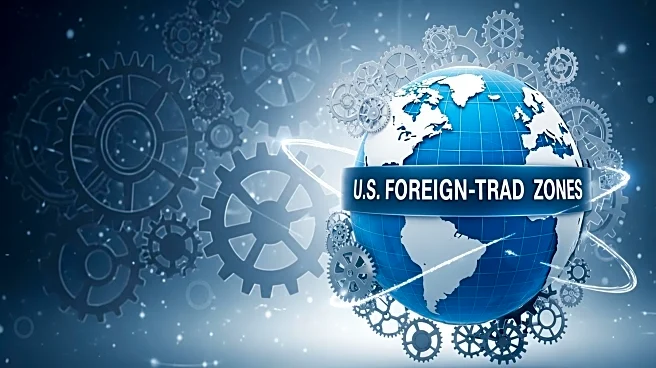What's Happening?
U.S. Foreign-Trade Zones (FTZs) are undergoing significant changes due to new tariff policies and executive actions. Established in 1934, FTZs allow companies to manage imports and exports under U.S. Customs and Border Protection supervision, providing benefits such as duty deferral and exemption on exports. Recent policy changes include the imposition of reciprocal tariffs and increased Section 232 tariffs on steel and aluminum, which affect the operational advantages of FTZs. Additionally, the end of duty-free de minimis treatment for low-value shipments is pushing more e-commerce flows towards FTZs. These changes are reshaping how companies utilize FTZs, impacting their ability to manage costs and compliance effectively.
Why It's Important?
The changes in tariff policies have significant implications for U.S. industries relying on FTZs for cost management and operational efficiency. The reciprocal tariffs and Section 232 measures limit the ability to reclassify goods for lower tariffs, affecting manufacturers and importers. The end of de minimis treatment increases the duty burden on e-commerce, making FTZs a crucial tool for managing these costs. As FTZs support a substantial portion of U.S. exports and employment, these policy shifts could influence the competitiveness of U.S. businesses in global markets. Companies must adapt to these changes to maintain their economic advantages and compliance with customs regulations.
What's Next?
Companies operating within FTZs will need to reassess their strategies in light of the new tariff policies. This includes updating economic models to account for privileged foreign status requirements and exploring operational efficiencies such as weekly entry filing and brokerage consolidation. Businesses may also consider activating private FTZ sites for greater control over compliance and inventory management. As the policy environment evolves, FTZs will continue to play a vital role in supporting U.S. trade and manufacturing, requiring operators to exercise sharper discipline in leveraging their benefits.
Beyond the Headlines
The evolving FTZ landscape highlights broader themes of trade policy adaptation and economic resilience. As companies navigate these changes, the role of FTZs in supporting U.S. jobs and investment becomes increasingly critical. The compliance-intensive nature of FTZs ensures that they remain a robust framework for managing trade dynamics, even as traditional advantages are narrowed. This underscores the importance of strategic planning and flexibility in maintaining competitive edges in a challenging global trade environment.









